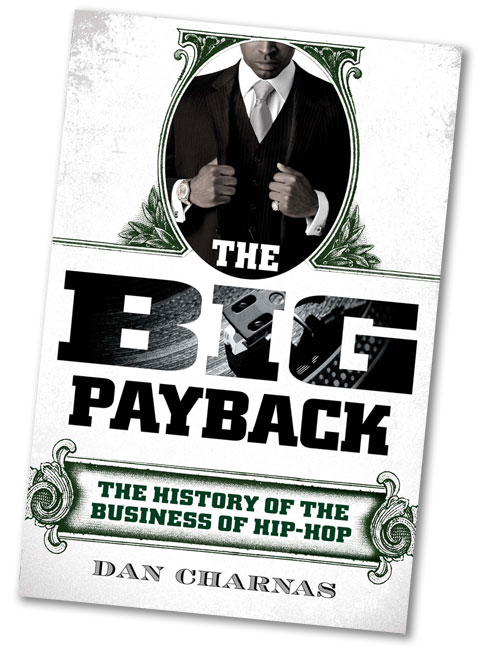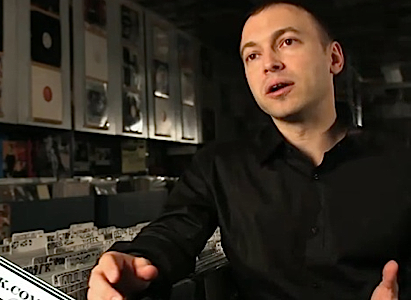Interview by Tony Samuel
The business of Hip Hop is full of eclectic characters. Dan Charnas gives us a VIP All Access Pass to the inner workings of the business of Hip Hop with complete insight into many of the accompanying characters. From the early beginnings of Hip Hop with Kool Herc, Grandmaster Flash and Afrika Bambaataa – Hip Hop as we know it has continuously evolved. The genre once considered to be a fad, has now become an integral part of pop music. Hip Hop created moguls and continue to generate billions of dollars on a worldwide level.

Entrepreneurship in Hip Hop has contributed significantly to the bottom line of a growing community of artists, producers, managers, writers, label owners, publicist and other stakeholders. From artists/executives like Jay Z, Cash Money’s Baby and Slim Williams, P Diddy, Dr Dre, Nelly, Ice Cube, 50 Cent, RZA, Eminem, Ice T, and Master P – Hip Hop has generated fortunes for a long line of people…It is virtually impossible to escape the reach of Hip Hop’s influence…even in the mainstream media. From clothing, news shows, to commercials etc., the power of Hip Hop has transcended the bowels of urban ghettos.
The Big Payback: The History of The Hip Hop Business is a comprehensive piece of literature. I would dare say…it is a scholarly work that should be required reading. It should be in the hands of every Hip Hopper and anyone else that thirsts to understand the people behind the business of Hip Hop.
Music industry magazine Insomniac was provided an exclusive interview with the author for this story. Dan Charnas has competently chronicled the business of Hip Hop and the charismatic figures that created a movement responsible for generating billions in revenues. Ladies and gentleman, let’s jump into the Hip Hop business interview:
Hip Hop pioneers don’t get the same respect as other music genre pioneers. Some would say rappers and Hip Hop heads in general do not respect their elders?
I am going to be honest with. I don’t know if that is true. I think the feuding is true because I think there are some people in Hip Hop…younger people… who don’t know their history…who don’t care about their history…who don’t give a damn about anything that happened before the year 2000…people I run into, who don’t know who Rick Rubin and Russell Simmons are…and don’t particularly care. There are some people who don’t know Young Money came from Cash Money. You gotta remember, Hip Hop is pop music now. When you move from the outskirt to the mainstream, you have a pool of fans that didn’t exist before. Pop fans are always fickle…they are not really deep. You probably remember when there was so few of us, a lot of us knew each other, we relived and cataloged things in our mind, remembered mix tapes we heard, remembered records we tried to find, remembered concerts that we saw…I think, among the core audience, there is a tremendous respect for the past. The only friction comes when you have a new generation who wants to break a bit from the past because they think the past is corny…music itself has become so disposable. How do you collect sh*t that comes to you for free? We use to collect records…now you get them for free. Why collect? What’s the value?
A lot of the new heads don’t even know what a record is…they don’t know anything about vinyl.
Yep.
As a Hip Hop researcher, what significant parallels do you see between Hip Hop and Rock & Roll?
Hip Hop is for all intent and purposes Rock & Roll. It served the same social functions as Rock & Roll did in the 50’s and 60’s. It is the heir to Rock & Roll. It inherited Rock & Roll’s place in our culture. It was a bridge between Black culture…Black people and White youth. It was a bridge for a certain amount of understanding and knowledge. It also became the foremost youth pop culture of America.
Moving on to Ice-T – Do you believe Ice T capitulated or did he just decide to do the realistic thing and move forward during the cop killer controversy?
No, none of my reporting led me to believe anything other than the fact it was a genuine move by Ice T to protect his own reputation and to protect his friends…I never got anything from Ice’s camp or from Warner Brothers that he was ever pressured directly by the record company to remove the record. The only discussion about removing it was before the album was released…and the person who suggested it was voted down by the executives of the company…He didn’t want Warner Brothers to continue to have bomb threats on his behalf and him not wanting to become a one trick pony…and a one issue artist. There were repercussions for him and for other artist down the line because it became easier to spook people.
I remember back in the day when WBLS actually stopped playing Hip Hop. What do you believe was the effect of that decision on Hip Hop?
I don’t want to single out BLS. Let’s just talk about Black radio in general. This is one of the reasons I wrote this book. Do you remember the tsunami song when Ms. Info got into a fight with Ms. Jones. There were demonstrations in front of Hot 97. (People were saying)…They are just using Hip Hop for profit! They basically accused Emmis of trying to degrade people of color for profit. The fact of the matter is, it did not happen that way. The reason Hip Hop ended up at pop stations is because Black radio simply refused to play it. They look down on the artist…they call it a ghetto thing…
I remember back in the day on WNWK…105.9…they use to have shows like Kevin Keith & The Dirty Dozen. I was a member of that show.
Word!
They use to be on Broadway. Every Saturday night we use to be up there. Do you remember Hank Love and Half Pint?
I use to give them checks every week.
Also, there were other shows like the Awesome Two. These guys were very valuable in pushing Hip Hop throughout the tri-state area. What is your view of the influence of these types of Hip Hop shows?
They were indispensable back in the day…completely indispensable.
Absolutely, I would agree with that. What is your view of Russell Simmons and his influence over the business of Hip Hop?
Read part two discussing Jay Z and Russell Simmons here.
-Tony Samuel





